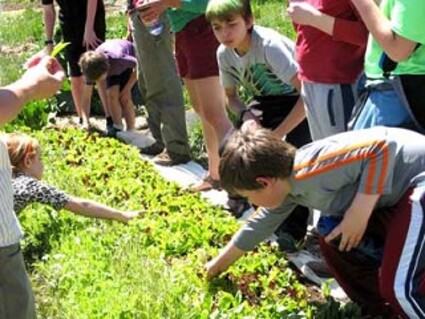BBS students get their hands dirty
Last updated 5/24/2016 at Noon

BBS students went to a local farm and a ranch to learn more about where food actually comes from. photo provided
Black Butte School in Camp Sherman is known for getting students out and about. Over the years, students have traveled to our nation's capitol and around the state on field trips.
This year, new head teacher Delaney Sharp and language arts and humanities teacher Ethan Barrons took on a field studies curriculum that continues the tradition a little closer to home.
The Cornerstone Field Studies program is science- based, interdisciplinary and takes place in both classroom and community. Fall studies focused on forestry and forest management; winter studies looked at water and snow pack.
Spring's focus is on food and farming.
"We're looking at humans and the environment through food production." said Sharp of the most recent studies. "This is a place- and project-based curriculum, and it works because we have the freedom to get the whole school out."
The entire school, all 17 students plus teachers and parent helpers, recently visited some local food producers in Sisters Country. The first stop was Mahonia Gardens and the Seed to Table garden, which share space on the Tehan family property. The next was Willows Ranch, on Indian Ford Road, to learn about grass-finished beef.
Mahohia Gardens is a community-supported agriculture (CSA) garden, run by Benji Nagel and Carys Wilkins. During a brief tour of the garden, Nagel and Wilkins encouraged students to put their observational skills to work and to use their senses while looking at (and occasionally tasting) the growing young plants.
Just steps away is the Seed to Table garden, which emphasizes food production and healthy living through garden-based education. Program director Audrey Tehan and farm manager Lauren Griswold assigned the students to three learning stations. Tehan got the students looking at compost from a microbe's perspective, Griswold did taste-tests with various vegetables, and intern Kailin Boyd had the students planting a row of lupines along a fenceline. She explained how lupines, a member of the legume family, improve soil performance by fixing nitrogen in the soil.
The older students nodded in understanding while the younger ones enjoyed digging in the dirt.
A few days later, the school bus rolled down the driveway at the Willows Ranch. Owned by Jim and Judi Knapp and managed by Allan and Kathryn Godsiff, the ranch has historically had cattle and horses on it. Seven years ago the Godsiffs began a grass-finished beef program similar to what they did in Allan's native New Zealand.
The students first walked through grass growing in the adjacent Forest Service grazing allotment. This grass was long and brown from a year's rest from grazing. The irrigated ranch pastures, one of which had been just grazed and one that was next on the rotation, were lush and green in comparison. The students were asked to look closely at each type of pasture and note their observations, which would be discussed at the end of the visit.
They also got an up-close look at this year's calves, who came over to investigate the visitors.
The property is managed using rotational grazing and low-stress cattle management, so the cattle were curious but unconcerned with the group. The students were encouraged by their teachers to watch the interactions between the cattle and the resident flocks of swallows swooping over the pastures eating insects.
The visit concluded with a sample of ranch beef jerky and a question-and-answer time on what the students had seen that day. An aspect of the field studies program is active journaling, and the students wrote or illustrated their findings.
A few more trips are on the calendar, and when the term is done the students will have seen gardens, beef cattle, a dairy, and pasture-raised hogs and chickens.
















Reader Comments(0)